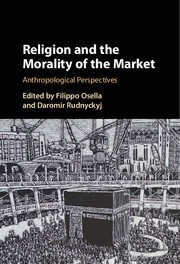Book contents
- Frontmatter
- Dedication
- Contents
- List of Figures
- List of Contributors
- Acknowledgments
- Introduction: Assembling Market and Religious Moralities
- 1 Risk, Fate, Fortune: The Lives and Times of Customs Inspectors in Southern China
- 2 Morality, Markets, and the Gospel of Prosperity
- 3 Religious Myths Retold: Masters and Servants in India's Corporate Culture
- 4 Divine Markets: Ethnographic Notes on Postnationalism and Moral Consumption in India
- 5 Merit Economies in Neoliberal Times: Halal Troubles in Contemporary Sri Lanka
- 6 “Structural Adjustment Islam” and the Religious Economy in Neoliberal Mali
- 7 Assembling Islam and Liberalism: Market Freedom and the Moral Project of Islamic Finance
- 8 Persistent Forms: Catholic Charity Homes and the Limits of Neoliberal Morality
- 9 Marketizing Piety through Charitable Work: Islamic Charities and the Islamization of Middle- Class Families in Indonesia
- 10 “A Poor Muslim Cannot Be a Good Muslim”: Islam, Charitable Giving, and Market Logic in Sri Lanka
- 11 “For God and the Country”: Agricultural Migrations and their Moralities in South India
- 12 “The Globalization of Indifference”: On Pope Francis, Migration and Global Acedia
- Index
- References
8 - Persistent Forms: Catholic Charity Homes and the Limits of Neoliberal Morality
Published online by Cambridge University Press: 13 April 2017
- Frontmatter
- Dedication
- Contents
- List of Figures
- List of Contributors
- Acknowledgments
- Introduction: Assembling Market and Religious Moralities
- 1 Risk, Fate, Fortune: The Lives and Times of Customs Inspectors in Southern China
- 2 Morality, Markets, and the Gospel of Prosperity
- 3 Religious Myths Retold: Masters and Servants in India's Corporate Culture
- 4 Divine Markets: Ethnographic Notes on Postnationalism and Moral Consumption in India
- 5 Merit Economies in Neoliberal Times: Halal Troubles in Contemporary Sri Lanka
- 6 “Structural Adjustment Islam” and the Religious Economy in Neoliberal Mali
- 7 Assembling Islam and Liberalism: Market Freedom and the Moral Project of Islamic Finance
- 8 Persistent Forms: Catholic Charity Homes and the Limits of Neoliberal Morality
- 9 Marketizing Piety through Charitable Work: Islamic Charities and the Islamization of Middle- Class Families in Indonesia
- 10 “A Poor Muslim Cannot Be a Good Muslim”: Islam, Charitable Giving, and Market Logic in Sri Lanka
- 11 “For God and the Country”: Agricultural Migrations and their Moralities in South India
- 12 “The Globalization of Indifference”: On Pope Francis, Migration and Global Acedia
- Index
- References
Summary
“Cleaning brushes. I'd say we need ten cleaning brushes and we need to replace them about once a month. So that's 120 brushes a year. At 700 shillings a brush we need 84,000 shillings a year for brushes.” It was nearly midnight and we were still up working. The six Ugandan, Kenyan, and Tanzanian nuns who had been placed in charge of a home for orphans and children with disabilities were responding to my requests for an accounting of their current annual budget, not with a document but with a late night meeting in which they attempted to align their former mother general's sparse report with their own remembered accountings. Given this home's mission of providing care, accommodation, and access to education for around 100 children and adults who have found themselves outside of the networks of care usually made of kin, much of this budgetary conversation took the form of a micro accounting of household items. And on it went into the night. These calculations were accompanied by a good bit of laughter as we were all enjoying the chance to be together and energized by the arrival of Ruth Petersen, a sixty-one-year old Peace Corps volunteer with five years of prior experience working with children with disabilities.
The laughter was also the result of the novelty of the task at hand. The sisters were not in the habit of engaging in such prospective budgeting. Instead, they took the help that came their way and used it to meet the most pressing needs. This trust in divine providence was both a lived tenet of their theology (Scherz 2013) and a matter of necessity, as the few large donors they still had were not interested in providing funds for such quotidian expenses as brushes and soap. Most of the foundations that had once supported their work had moved on to more “sustainable” projects, preferring community-based projects, advocacy, and awareness raising campaigns to the forms of material charity provided by institutions such as Mercy House. In the end, their anticipated income fell short of their anticipated operating expenses (which totaled some 50 million Ugandan shillings, or approximately US$25,000), by nearly half.
- Type
- Chapter
- Information
- Religion and the Morality of the Market , pp. 177 - 195Publisher: Cambridge University PressPrint publication year: 2017
References
- 1
- Cited by

